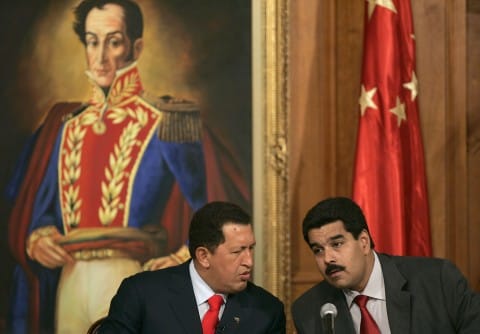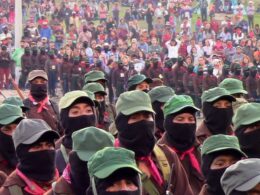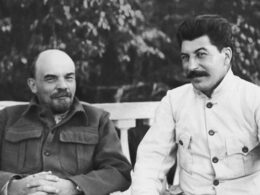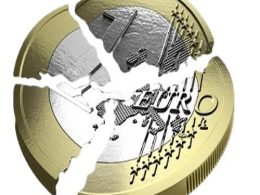Over the last number of days it has become clear that that the Trump regime and US imperialism are seeking to overthrow the Presidency of Nicolás Maduro in Venezuela by recognising the President of the Venezuelan National Assembly, Juan Guaido. This is not the first time that US imperialism has sought to do this. We republish below an article by Socialist Party member and Solidarity councillor Michael O’Brien on the the key lessons of the Chavista movement in Venezuela from our journal “Socialist Alternative”, written in October 2017.
“The problem with the values and policies of the far left is that they want to sacrifice the economy to pay for improvements in society, without understanding how quickly it becomes unsustainable. Venezuela is just the most recent example of this – a promising start is ending in bankruptcy, poverty and oppression. There are many other examples in history of exactly this. The far left wants to do everything based on nothing and wants everything to be free and paid for by someone else. This is an unsustainable model which can only fail.”
– Taoiseach Leo Varadkar, 11 October 2017 during Dáil debate on Finance Bill
It is almost 20 years since Hugo Chavez was elected President of Venezuela, assuming power on a programme that sought to challenge the policies of neo-liberalism and in turn lifting the hopes of millions of workers, poor and indigeneous that fundamental change would be delivered. Today it appears these hopes are turning into despair.
Inflation stands at 800%. The IMF calculates that GDP is 65% of what it was four years ago which compares with the scale of economic decline seen in the US during the great depression and the immediate aftermath of the collapse of the Stalinist regimes in Eastern Europe and the former Soviet Union.
The economic and social crisis that has accelerated in the four years since Chavez’s passing and succession by Nicolas Maduro has been seized upon by Leo Varadkar, Paschal Donohoe and right wingers the world over as fresh proof positive of the failure of socialist policies. In Britain, the street violence that took place at the instigation of the right in Venezuela after last July’s Constitutional Assembly elections was an occasion for a sustained media assault on Jeremy Corbyn because of his past sympathies for the administration.
Socialists have to respond to these barbs. In doing so, our starting point has to be an accurate appraisal of the nature of the Venezuelan economy and the various phases of the Chavez/Maduro administration.
Furthermore in our response we must avoid two pitfalls which have been a feature of the left and “progressive” discourse about the crisis in Venezuela. Firstly there has been a level of criticism of the regime that is blind to the undemocratic actions of a right wing opposition which seeks to drag Venezuela back to the pre-Chavez days. Then there is the opposite phenomenon, of which the likes of Look Left magazine in Ireland is emblematic, whereby coverage glides over the mistakes of the Chavez/Maduro regime.
Chavez election
The old Venezuelan elite, backed by the US and the Catholic Church, were never reconciled to Chavez’s election in 1998. Chavez’s reputation was built on the back of a failed left-wing coup ‘Operación Zamora’ he spearheaded in 1992 which came in the aftermath of the worst phase of the neo-liberal reforms for which the whole of Latin America served as a laboratory in the 1980s. His subsequent release from prison paved the way for his entry into electoral politics. He styled his political programme ‘Bolivarianism’ after the the man they call the “liberator”, Simon de Bolivar, who led the independence struggles against the Spanish empire which paved the way not just for the independence of Venezuela but also Colombia, Ecuador, Bolivia, Peru and Panama.
Fundamentally Chavez’s early politics, embodied in his political vehicle The Movement For a Fifth Republic (MVR), represented a desire to steer Venezuela on a course away from neo-liberalism and more towards a capitalist developmental model with a measure of redistribution within that framework in favour of the poor.
That he emerged from outside the elite, was part indigenous and represented a break from the neo-liberal consensus meant that the traditional conservative political establishment were never going to see him as a safe pair of hands to defend their interests.
In the aftermath of a failed right wing coup in 2002 (famously filmed by a pair of Irish documentary makers in the The Revolution Will Not Be Televised), followed in quick succession by a bosses’ lockout in late 2002 – early 2003 and a failed recall referendum in August 2004, Chavez, at a public rally as the World Social Forum in Porto Alegre, Brazil in January 2005, announced a left turn.
“Socialism in the 21st Century”
Chavez at this event described his attempts to co-exist with the capitalist class who sought to undermine his reforms at every turn as a “farce” and declared that 21st Century Socialism was his new objective. This announcement went hand in hand with an acceleration of investment in healthcare, housing, food distribution and education harnessing the revenues of the publicly owned oil industry and taking full advantage of the high oil prices that pertained at that time.
The new political vehicle for his project was the PSUV (Socialist Unification Party of Venezuela) launch in 2007, which incorporated the traditional left and communist parties as well as the MVR. “Bolivarian Circles” were created as a type of parallel state apparatus involving a level of local discussion but the reforms were definitely driven from above.
Nationalisations and experiments in worker co-management of some enterprises occurred at this juncture but here the initiative rested with the workers. In prominent paper and aluminium factories, among others, workers maintained production in response to the employers abandoning enterprises. These seizures were subsequently ratified by the Chavez administration.
What remained absent despite official acknowledgement of the administration’s overreliance on oil revenues was an industrialisation policy that would diversify the economy and ease its considerable reliance on imports of basic commodities, especially food. Food imports even at the peak of Chavez’s support were in the order of 70% of total food consumption. Such was the vulnerability of Venezuela on the question of food that state organised distribution became a permanent feature after the bosses lockout referred to earlier.
Dangerous reliance on oil revenue
Therefore the crisis that began to emerge under Chavez’s own watch after the onset of the global economic crisis and decline in oil prices was foreseeable to some on the left, including the Socialist Party’s international co-thinkers in the Committee for a Workers International.
To locate the subsequent cutting back on social spending and spiralling inflation in a supposed failure of socialism as Varadkar and co. claim is turning reality on its head. The reality is that Venezuela was and remains fundamentally a capitalist economy, notwithstanding the hostility the capitalist class towards the Chavez/Maduro administration. From a position of total disarray in 2006 when Chavez retained the presidency with increased support, the right havee – barring the 30th July elections to the new National Constituent Assembly, which they boycotted – been resurgent.
Growing right-wing opposition
The candidate of the right Henrique Capriles ran Maduro close in the 2013 Presidential elections with a margin of 1.5% . His MUD (Democratic Unity Roundtable) coalition are the principle electoral expression of the right wing opposition that gained almost two-thirds of seats in the last parliamentary elections.
There is also resurgent street movement populated by the middle and upper class youth, with some participation from workers thoroughly disaffected by the hardships to a point of total alienation from the regime.
More present on the street element of the right wing opposition is Voluntad Popular led by the jailed Leopoldo Lopez. The protests of the right have been the scene of effective lynchings of people suspecting of being Chavez/Maduro supporters resulting in 112 deaths.
Yet this is the opposition that recently was awarded the prestigious Sakharov prize for human rights. Again through the distortive lens of international media coverage the extreme violence of the right is effectively blamed on Maduro.
The viciousness of the right in Venezuela goes some way to explaining the outcome of last July’s election to the new constituent assembly that takes precedence over the already existing parliament dominated by the right. Despite the massive privations and economic dislocation some eight million turned out participate and vote for pro-administration candidates. Effectively the core Chavez/Maduro support held up, which can be interpreted more as a fear and loathing of what the old right represent than a ringing endorsement.
There is no cause for complacency however on the part of the Maduro administration. The fact he has had to resort to constitutional manoeuvrings to the extent of conjuring up a new layer of government rather than deal decisively with the problems that people face is a demonstration of weakness.
The growth of bureaucracy
Leaving aside the right opposition, the administration needs to be judged on its own conduct. The promise of grassroots participative democracy that many hoped the Bolivarian circles represented have been dashed. Instead a self serving bureaucracy has grown over the course of the last two decades, large elements of which are as corrupt, inept and self-serving as seen in any other neo-colonial regime, with tens of billions of dollars in funding for infrastructural projects disappearing and a thriving black market for basic commodities. This same bureaucracy is overseeing the despoilment of virgin rainforest for multinational extractive industries putting them on a collision course with indigenous peoples who for so long were a bedrock of support for Chavez.
The so-called Boliburguesía, short for Bolivarian Bourgeoisie, have to be held to account and seen as an obstacle in their own right to the real transformation of Venezuelan society. A significant component of this exploitative layer is located in the armed forces from which Chavez and many of his allies emerged. For now this marks Venezuela as different from the Allende experience in Chile in the sense that the dominant trend in the tops of the armed forces see themselves as having a material stake in the current set up.
However, as seen in Egypt where the army similarly have extensive economic interests, points can be reached where they will come to terms with an emerging opposition rather than be dragged down by an unpopular administration.
The nature of the bureaucracy and their very actions against workers and left activists who critiqued the administration from the left underscores the need for political and industrial organisation independent of the PSUV. The large amount of people who sought nominations for the 30th July elections this year, which including people seeking a new left turn by the regime, is a partial positive indication that the raw material for a genuine left opposition to the bureaucracy exists. But the manner in which the PSUV imposed pro-bureaucracy candidates points to the dead end that that organisation represents and the need for any genuine internal opponents to work outside with what exists of the independent workers’ movement.
Impact on Latin America
The negative turn of events in Venezuela have to been seen in a wider Latin American context. To a greater or lesser degree the trend towards left or non-traditional left-leaning Presidents being elected across the entire continent bar Colombia – which was a feature of the first decade of this century – has gone into reverse, with Morales in Bolivia and Moreno in Ecuador holding out alongside the pale pink administrations of Bachelet in Chile and Vasquez in Uruguay.
This has taken place not just through quasi-constitutional or judicial coups as in Brazil and Paraguay but also at the ballot box in Argentina and Peru. Similar to Venezuela the commodities booms and trade with China in particular which helped sustain popular reforms obscured the fact that fundamental socialist change had not occurred, leaving all these administrations exposed and undermined. That is the core lesson of the Venezuelan and Latin American experience.
This is a lesson that some on the left completely avoid. In the New Left Review’s lengthy and informative interview with left academic Julia Buxton, her concluding advice was the need for more “dialogue” with the opposition.7
Chavez in his dying days owned up to the failings he presided over. In a preface to the 2013 – 2019 economic plan he said:
“This is a programme for the transition to socialism and the radicalisation of participatory democracy. We should not delude ourselves—the socio-economic form that prevails in Venezuela remains capitalist… This programme is aimed at the “radical suppression of the logic of capital” and a continuing transition to socialism. For new forms of planning and production for the benefit of the people to emerge requires “pulverising” the bourgeois form of the state that is still reproducing itself through its abominable old practices.”
The problems that built up in the latter end of Chavez’s time as President, the continuing process of derailment under Maduro and the corresponding recovery of the right were predictable dangers.
How can socialism be achieved?
When Chavez spoke of socialism in the 21st century at that rally in Porto Alegre he elaborated somewhat on his conception of how socialist transformation would take place. He spoke of a decades long steady “transcendence” of capitalism, effectively a peaceful displacement by dint of a building up of public services and publicly supported enterprise. Implicit in this was that native and international hostile capitalist interests operating in Venezuela would not be decisively confronted, nationalised and integrated into a democratically planned economy.
A massive historical opportunity was squandered in the immediate aftermath of the failed right wing coup and subsequent bosses’ lockout to go all the way in transforming Venezuela. Some, even on the Marxist left such as Alan Woods, leader of the so-called “International Marxist Tendency”, who became something of a court advisor to Chavez repeatedly and over-generously referred to the best of his achievements as representing “half a revolution”.
Revolution as an act and as a process cannot be helpfully measured in fractions. In terms of hard statistics the large majority of the economy has always remained in private hands. Timewise, revolution by definition cannot take place over the decades found in Chavez’s conception. Rather, the crises that inevitably come with capitalism and the active sabotage by the capitalist class when faced with a regime they see as hostile, forces choices. In the case of the Chavez/Maduro administration, their choice has been to adapt to these pressures and crises in a manner that is rapidly undermining their project.
The workers and poor of Venezuela are paying a heavy price for this. They have a stake in a different set of political choices that point to a fundamental break with capitalism, and to socialist change as the only means to safeguard and build on what good came out of the earlier phase of the Bolivarian revolution.












